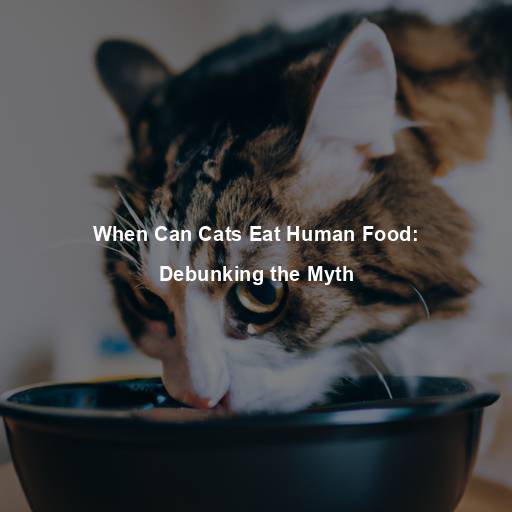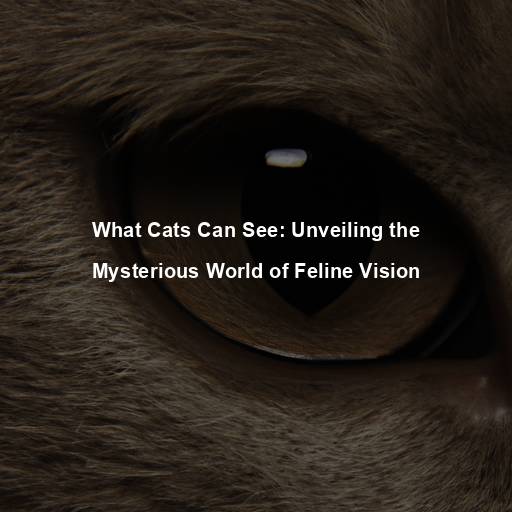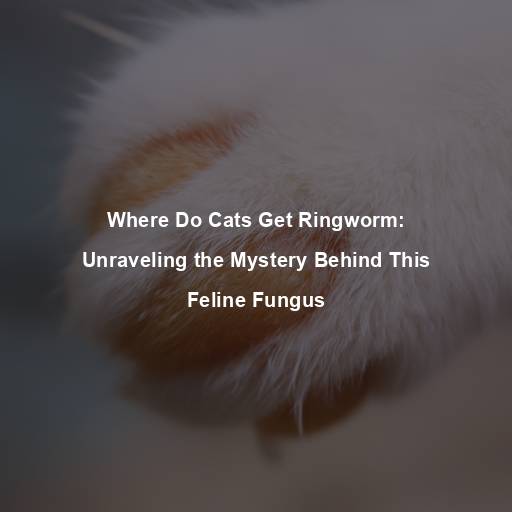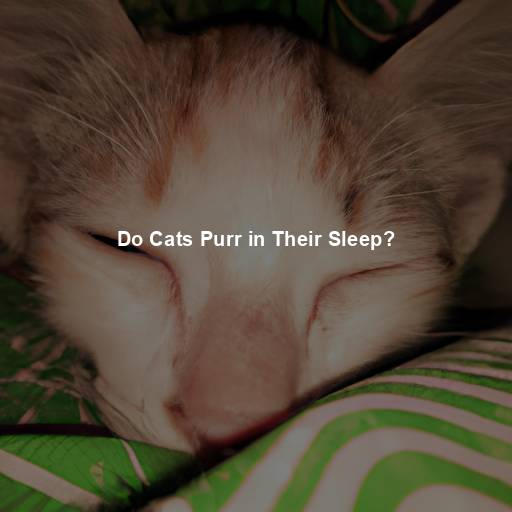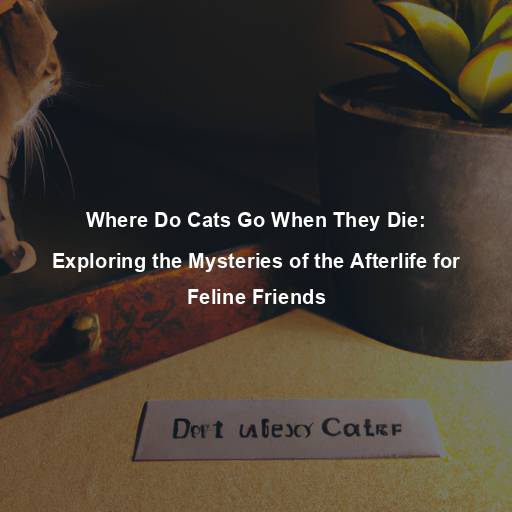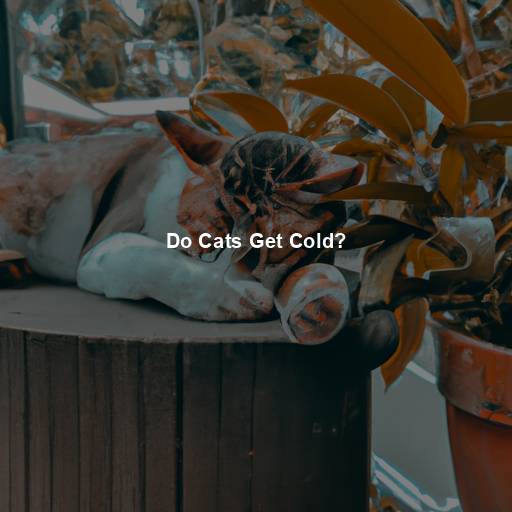When Can Cats Eat Human Food: Debunking the Myth
Last Updated on October 23, 2023 by Evan
Contents [hide]
- 1 Understanding the Nutritional Needs of Cats
- 2 The Role of Responsible Pet Ownership
- 3 Consulting a Veterinarian: Your Pet’s Best Advocate
- 4 FAQs for When Can Cats Eat Human Food
- 4.1 Can cats eat human food?
- 4.2 What human foods are safe for cats to eat?
- 4.3 Are there any human foods that are toxic to cats?
- 4.4 Can I give my cat milk or dairy products?
- 4.5 Should I give my cat table scraps?
- 4.6 Can I give my cat treat-like human foods?
- 4.7 What should I do if my cat accidentally eats human food it shouldn’t have?
Understanding the Nutritional Needs of Cats
Cats are fascinating creatures that constantly keep us on our toes. As responsible pet owners, we strive to provide them with the best care possible, including a well-balanced diet. One common question that often arises is whether it is safe for cats to consume human food. While it may be tempting to share our meals with our feline friends, it is essential to understand their unique nutritional needs and the potential risks associated with feeding them human food.
The Carnivorous Nature of Cats
To comprehend the dietary requirements of cats, we must first acknowledge their evolutionary background. Cats are obligate carnivores, which means their bodies are specifically adapted to thrive on a diet consisting mainly of animal-based proteins. Unlike humans and omnivorous animals, cats lack certain digestive enzymes necessary for the proper breakdown of plant matter. Therefore, a diet primarily composed of animal protein is vital for their overall health and well-being.
The Dangers of Feeding Cats Human Food
Cats, those enigmatic creatures with their inquisitive glances, often display an unwavering interest in our culinary choices. However, we must tread carefully, for not all earthly delights are meant to be shared with our feline companions. It is imperative to understand that feeding cats a diet predominantly composed of human food can invoke a bewildering array of health afflictions and the precarious dance of nutritional inadequacies. A perilous concoction of dangers lurks in the shadows, waiting to pounce upon unsuspecting cat owners who dare to indulge their furry friends in the forbidden realm of our gastronomic realm.
-
Toxicity: Certain human foods contain substances that are toxic to cats. For instance, onions, garlic, chocolate, caffeine, grapes, raisins, and alcohol can be extremely harmful and even life-threatening to our feline companions. It is crucial to be aware of these toxic foods and ensure they are kept out of reach.
-
Nutritional Imbalances: Human food is often nutritionally inadequate for cats. While cats require specific nutrients such as taurine, arachidonic acid, and vitamin A, these may not be present in sufficient quantities in a typical human diet. Feeding cats an imbalanced diet can lead to deficiencies and subsequent health problems.
Discover the shocking truth about the hidden enemies lurking in your cat’s diet! It’s time to confront the alarming reality that many human foods secretly sabotage your feline friend’s health by piling on the pounds. Whether it’s the seductive allure of fats, sugars, or sneaky carbohydrates, these dietary villains are responsible for the alarming rise in feline obesity, a ticking time bomb for your fluffy companion. Brace yourself for the devastating consequences, from diabetes to arthritis and even heart problems, as we unravel the perplexing link between diet and disease.
- Gastrointestinal Upset: Cats have sensitive digestive systems that may not tolerate certain human foods well. Feeding them rich or fatty foods can result in gastrointestinal upset, leading to symptoms such as vomiting and diarrhea.
Safe Human Foods for Cats
As a diligent pet owner, it’s essential to prioritize a nutritionally balanced diet for your beloved feline friends. While commercial cat food is generally recommended, it’s intriguing to explore a few human foods that can be cautiously integrated into their regimen. However, it’s crucial to remember that these foods should only complement their regular meals and should not overshadow them. Here are some intriguing options for occasional cat treats from the human pantry:
Whether it’s a succulent piece of grilled chicken or a tender slice of turkey, cooked meats can make a delightful treat for our feline friends. However, it’s crucial to exercise caution by removing any bones and excess fat, while also being mindful of seasonings that might not agree with their delicate stomachs. Just like us, cats enjoy a burst of flavor in their meals, but let’s keep it healthy and safe!
-
Fish: Cats are often associated with a love for fish. While small amounts of cooked fish, like salmon or tuna, can be offered occasionally, it is essential to ensure that it is boneless, cooked thoroughly, and does not contain any sauces or seasonings.
-
Plain Rice or Pasta: Plain cooked rice or pasta without any seasoning can be given to cats in small quantities. These can provide a bland alternative for cats with digestive upset.
When it comes to adding a touch of wholesome goodness to your furry friend’s diet, incorporating fresh fruits and vegetables may seem like a tantalizing idea. However, navigating this nutritional maze can be perplexing. While small portions of cooked pumpkin or steamed carrots can serve as a delectable treat, it’s imperative to delve into thorough research to ensure that the chosen produce isn’t a toxic concoction for your feline companion.
The Importance of Consultation
Before introducing any human food into a cat’s diet, it is essential to consult with a veterinarian. They can provide personalized advice based on your cat’s specific nutritional requirements, health conditions, and dietary restrictions. Your veterinarian can guide you on safe and appropriate human foods for your cat, ensuring their overall well-being.
Chocolate and Caffeine
The allure of chocolate and caffeine is undeniable for many of us, but it’s critical to be aware of the potential dangers they pose to our feline companions. Unfortunately, theobromine and caffeine, present in these enticing substances, can wreak havoc on cats’ delicate systems, leading to a range of alarming symptoms, including heightened heart rates, unsettling tremors, unpredictable seizures, and tragically, even mortality. To safeguard the well-being of your beloved feline friend, it is imperative to keep all chocolate and caffeinated products far beyond their curious reach.
Onions, Garlic, and Chives
It’s no secret that onions, garlic, and chives add a flavorful punch to our human meals. However, what may come as a surprise is that these seemingly harmless ingredients can be potentially lethal for our feline friends. Believe it or not, these innocent bulbs can wreak havoc on a cat’s delicate system by targeting their red blood cells and causing anemia. In the worst-case scenarios, indulging in dishes containing onions, garlic, or chives can even lead to organ failure.
Grapes and Raisins
When it comes to feline health, not all fruits are created equal. Believe it or not, something as innocent as grapes or their dried counterparts, raisins, can spell danger for our furry friends. It’s a perplexing fact that even a tiny nibble of these seemingly innocent fruits can lead to kidney failure in cats. As a responsible cat parent, it’s essential to keep grapes and raisins out of reach, and if you suspect any accidental ingestion, don’t hesitate to rush your precious furball to the vet pronto!
Alcohol
Alcohol consumption by cats is incredibly dangerous and should never be allowed. Even small amounts of alcohol can cause severe intoxication, leading to symptoms such as disorientation, vomiting, difficulty breathing, and even coma. It is crucial to keep all alcoholic beverages securely stored and away from your curious kitty.
Dairy Products
Although cats may find immense pleasure in indulging in dairy delicacies such as milk, cheese, or yogurt, a perplexing truth lies beneath the surface. It turns out that many adult cats, in all their feline glory, possess an uncooperative relationship with lactose, rendering them lactose intolerant. To unravel this feline enigma, it becomes evident that cats lack the enzyme, lactase, which is vital in assimilating lactose, a sugary component found in milk and its byproducts. The outcome of feeding our dignified furry friends dairy can be shrouded in gastrointestinal chaos, leading to an unpredictable journey of undesired outcomes, including the dreaded duo of diarrhea and stomach discomfort.
On the Safe Side: Treat Options for Cats
If you’re looking for safe and appropriate treats for your feline friend, there are plenty of options available specifically formulated for cats. These treats are designed to meet their nutritional needs and provide a delicious reward. Additionally, there are a variety of commercially available cat-friendly treats that come in different flavors and textures. Consult with your veterinarian to find suitable treats for your cat, ensuring they are tasty, nutritious, and safe.
The Role of Responsible Pet Ownership
When it comes to our furry friends, we hold the honorable position of keeping their health in check. One significant factor? Nourishment – a topic covered left, right, and center. As hard as it may be to resist those pleading eyes, it’s crucial to grasp the consequences and nutritional complexities that come with sharing our meals with the purr-fect pals.
Consulting a Veterinarian: Your Pet’s Best Advocate
When it comes to our furry feline friends, their diet is a topic that can leave us scratching our heads. We may find ourselves in a whirlwind of questions and concerns about what is safe and what isn’t. In times like these, it’s essential to reach out to the experts who can ease our worries and offer tailored guidance – the veterinarians. With their wealth of knowledge and understanding of our cats’ unique needs and health conditions, they can pave the way to a well-rounded and nutritious diet, ensuring our beloved companions thrive.
Commercial Cat Treats
Discover a captivating array of commercially available cat treats designed to fulfill the unique nutritional requirements of our beloved feline companions. Immerse yourself in a world brimming with a plethora of flavors, textures, and sizes, ensuring an exceptional indulgence for your precious cat. Seek out treats crafted with utmost care, using only the finest ingredients, untainted by artificial additives or preservatives, elevating the delight and safeguarding your cat’s dental well-being. Let the tapestry of taste and quality envelop your cat’s senses, leaving them in a state of blissful satisfaction and pure perplexity.
Homemade Cat Treats
For those who find joy in expressing their culinary prowess, why not extend that creativity to the feline members of our households? Homemade cat treats provide the perfect opportunity to tailor the ingredients to suit our beloved cats, ensuring their safety and well-being. The realm of feline delicacies welcomes a plethora of recipes, offering tantalizing options such as succulent cooked chicken, flavorful tuna, and even the captivating allure of catnip. However, it is vital to embark on this culinary adventure armed with precise recipes specifically designed to cater to the nutritional needs of our feline companions – a pro tip to safeguard their health and happiness.
Interactive Toys and Puzzle Feeders
Looking for alternative ways to treat your feline friend? How about engaging in interactive play or introducing puzzle feeders? These clever toys and feeders not only tap into your cat’s natural hunting instincts but also provide much-needed mental stimulation. Spice things up by swapping out traditional treats for small, bite-sized commercial goodies or even their regular kibble during playtime.
Safe Human Foods as Occasional Treats
Cats are notorious for being picky eaters, and rightfully so. Although the majority of human cuisine doesn’t align with their dietary needs, there are a select few exceptions that can be doled out as tantalizing indulgences. But wait, before you start feeding your feline friend like a generous chef, please bear in mind that these delicacies should only be presented sparingly and should never impede on their balanced cat chow. To satiate their curious palates without sacrificing their well-being, consider treats like:
- Cooked Chicken or Turkey: Remove any bones, skin, or seasoning before offering small pieces of cooked chicken or turkey to your cat.
Indulge your four-legged friend with a delectable surprise – boneless, cooked fish such as succulent salmon or tantalizing tuna is bound to tickle their taste buds. However, be sure to prepare it with utmost care, ensuring it’s cooked to perfection and devoid of any sauces or seasonings that might not sit well with their delicate stomachs.
- Steamed Vegetables: Small portions of steamed vegetables like carrots or green beans can be offered as an occasional treat. However, avoid any vegetables that are toxic to cats, such as onions or garlic.
Remember, moderation is key when offering these human foods as treats. Always consult with your veterinarian before introducing any new foods into your cat’s diet.
FAQs for When Can Cats Eat Human Food
Can cats eat human food?
Cats have specific dietary needs and it is generally not recommended to feed them solely with human food. While some human foods can be safe for cats in moderation, it is essential to understand that their nutritional requirements differ significantly from ours. Feeding cats a balanced diet formulated for their unique needs is crucial to their overall health and well-being.
What human foods are safe for cats to eat?
It’s a topic that has left many cat owners puzzled and perplexed – can our feline friends nibble on certain human foods without any harm? Well, the verdict is in: some human foods can actually be safe for cats, but there’s a catch. In small quantities, plain cooked meat like chicken or turkey, eggs cooked to perfection, and plain cooked rice or pasta can make the cut. And if you thought that was mind-boggling enough, brace yourself – even plain cooked vegetables like carrots or green beans can be on the menu. But don’t forget, dear readers, to introduce these tantalizing tidbits gradually and keep a watchful eye on your fur baby’s reaction.
Are there any human foods that are toxic to cats?
Yes, there are several human foods that can be toxic to cats and should be avoided at all costs. Foods like onions, garlic, chives, grapes, raisins, chocolate, caffeine, alcohol, and any products containing xylitol can be extremely harmful to cats. These foods can cause various health issues ranging from gastrointestinal upset to severe poisoning or organ damage, which may even be fatal for cats.
Can I give my cat milk or dairy products?
It’s a common misconception that cats and milk go hand in paw, but the reality may surprise you. Despite our feline friends’ fondness for the creamy liquid, it turns out that most adult cats actually struggle to digest milk sugars due to their lactose intolerance. So, while the idea of a cat lapping up a bowl of milk may seem charming, it’s important to resist the temptation. Instead, opt for fresh water, which is not only more suitable for their hydration needs, but also helps prevent any tummy troubles that could leave both you and your furry companion perplexed.
Should I give my cat table scraps?
Feeding your cat table scraps on a regular basis is generally not recommended. Table scraps often consist of highly seasoned or fatty foods, which can lead to digestive issues or even pancreatitis in cats. Additionally, it can create bad habits and encourage begging behavior. If you wish to treat your cat occasionally with small portions of plain, cooked human food from a balanced and safe list, ensure it is done sparingly and without adding any spices, seasonings, or oils.
Can I give my cat treat-like human foods?
When it comes to treating our furry feline friends, the market offers a tantalizing assortment of nutritional delights tailored specifically for cats. These delectable morsels are carefully crafted to meet their divine dietary requirements, making them a far wiser choice than surreptitiously sneaking human fare under the table. But, oh, if the fancy strikes and you yearn to indulge your majestic companion with a tiny taste of our own temptations, tread with trepidation! Proceed with an abundance of caution, ensuring the edible temptation is free from perils and poisons that could befuddle their dainty digestive systems. Remember, dear reader, discretion is key, and consulting the wise counsel of your veterinarian is the sage decision to ascertain whether the treat is fitting for your regal feline’s personal palace of health and sustenance.
What should I do if my cat accidentally eats human food it shouldn’t have?
If you suspect or know that your cat has ingested something toxic or harmful, it is important to contact your veterinarian immediately. They can provide guidance on the necessary steps to take based on the specific situation and symptoms observed. Prompt veterinary care is crucial to prevent any potential severe health issues and to ensure the well-being of your cat.

